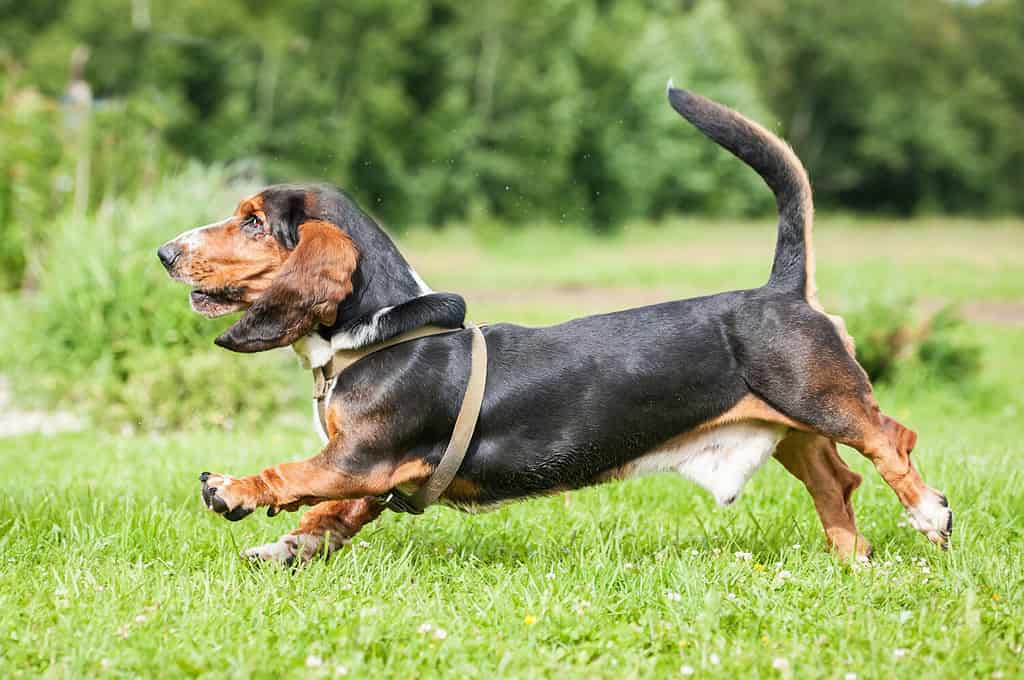Basset hounds are often very misunderstood. They have a reputation for being a bit “slow.” However, you may be incorrect about basset hound intelligence. They may not jump up quickly or take the initiative. However, they have a powerful sense of smell and high problem-solving abilities.
Of course, that doesn’t mean they are fast to learn cues or listen to their owners. They tend to be independent thinkers. Basset hound intelligence doesn’t contribute to their obedience in the least.
Canine intelligence isn’t black and white, though. Different dogs are smarter in different areas, and ranking dogs according to their intelligence can be challenging. Let’s take a look at the specifics:
Basset Hound Intelligence

These dogs can be pretty active when they are younger, so exercise before training is recommended.
©Rita_Kochmarjova/Shutterstock.com
Basset hounds are intelligent. They are intelligent, specifically regarding their adaptability and problem-solving abilities. They have a perfect sense of smell and excel at tracking, a type of intelligence. Their ability to track in the field is phenomenal.
With enough patience and proper training, they can be trained. However, they aren’t as trainable as other dogs. They are more independent, making them less likely to listen to your cues. Therefore, they can take a bit more to train.
Their strong scent drive, so they’re easily distracted. They have a short attention span, so training sessions must stay short. They are less likely to follow commands than other dogs.
Basset hounds are also resistant to training. They can be stubborn, especially as they get older. They tend to be most open to training when they are younger.
Basset Hounds Compared to Other Dogs

This breed is prone to a variety of behavioral problems, including digging.
©Akos Nagy/Shutterstock.com
Stanley Coren, a professor at the University of British Columbia, conducted the most extensive study of canine intelligence. He published his findings in the bestseller book The Intelligence of Dogs. In his book, he discussed three aspects of dog intelligence: instinctive, adaptive, and working intelligence.
- Instinctive: The dog’s ability to do tasks they were bred for, such as herding, pointing, and guarding.
- Adaptive: The dog’s problem-solving abilities.
- Working: The dog’s ability to learn commands and learn from humans.
Based on these three types of intelligence, basset hounds would rank highly in the instinctive and adaptive categories. They’re very good at tracking scents and solving problems. However, they are less capable of learning from humans.
In working intelligence, basset hounds do not rate highly. In fact, they are rated 71st out of 79 dog breeds. That puts them in the “low degree of obedience” category. It took them over 80 repetitions to learn a new command, and they only followed commands around 25% of the time.
That’s exceptionally low, but that doesn’t necessarily mean they aren’t intelligent.
How to Efficiently Train a Basset Hound
We know that basset hounds aren’t the easiest to train, as they have a low obedience rating. However, they are still trainable with the right approach.
We highly recommend using positive reinforcement training with treats, praise, and affection. You must make the training process fun for your canine, or they may just stop listening to you.
Punishment is very ineffective and can damage your bond with your basset hound. They likely won’t stay tuned into the training session if they aren’t having fun.
Basset hounds have exceptionally short attention spans. It’s important to keep sessions 5 – 10 minutes long at most. It’s important to repeat training sessions throughout the day. Frequent, short training sessions work much better than long sessions.
Because these dogs take far longer to train than others, staying patient and consistent is important. You need to lower your expectations of your dog’s levels. Your dog will take at least 80 repetitions to learn a command. That’s a lot, especially considering how short you must keep your sessions.
Don’t expect your basset hound to be particularly obedient, either. Make training engaging and interactive to keep their attention. You should expect them to need treats regularly, even after mastering a command. They aren’t dogs that were built to be obedient.
When to Start Training Your Basset Hound

Basset hounds can be very laidback, but this can sometimes be a problem if you’re trying to train them.
©Daniel Myjones/Shutterstock.com
Begin training as early as possible. It’s essential to establish good habits early on. Otherwise, you may have a much harder time reaching them when they are adults. You should focus on building a strong bond by spending quality time with your dog, like playing and cuddling.
Building trust early can make training easier, as your dog may be more inclined to listen to your commands.
Don’t forget to socialize the puppy, too. These dogs are often pretty friendly, but exposure to different people and places is still important. Otherwise, they may be fearful as adults.
Consider enrolling your dog in puppy training classes. These provide extra socialization and training, which can both be helpful when dealing with these more complicated dogs. Consulting with a professional dog trainer can also be beneficial, as training hiccups will likely arise with this breed.
Common Training Challenges for Basset Hound
The biggest training challenge for basset hounds is their independent nature. They tend to be very stubborn, making them resistant to following commands. They may not listen at all if they don’t see the immediate benefit.
Their strong sense of smell can also lead to lots of distractions. They’re more likely to listen to their nose than their owner in practically all situations.
Basset hounds are sometimes food-motivated. However, some dogs have a problem where they may not be food-driven enough for training purposes. Some aren’t willing to sacrifice their independence for a treat, making them harder to train. Sometimes, you may have to use a different motivator, like toys or praise.
While these dogs are often very friendly, they can also become shy. Therefore, it’s essential to socialize them when they are younger. Otherwise, they can develop fear-based aggression against anything they aren’t used to.
Other potential challenges include leash-pulling, mainly because they love to sniff. They are prone to pulling on the leash during walks, especially if they come across a scent trail.
Basset hounds can be vocal, so consistent training to address this issue may be required. Plan on teaching your dog a “quiet” command. They may also suffer from separation anxiety, which can make their barking even worse. Crate training can help prevent separation anxiety by teaching your dog to be alone in a positive manner.
The photo featured at the top of this post is © Mindaugas Dulinskas/iStock via Getty Images
Ready to discover the top 10 cutest dog breeds in the entire world?
How about the fastest dogs, the largest dogs and those that are -- quite frankly -- just the kindest dogs on the planet? Each day, AZ Animals sends out lists just like this to our thousands of email subscribers. And the best part? It's FREE. Join today by entering your email below.
Thank you for reading! Have some feedback for us? Contact the AZ Animals editorial team.







